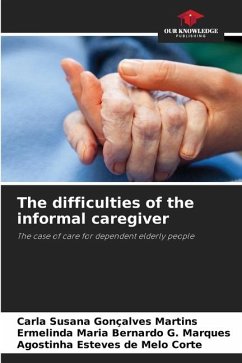
Informal Caregivers: From Hidden Heroes to Integral Part of Care

PAYBACK Punkte
27 °P sammeln!
This book builds on the current trends in informal caregivers' role in the supportive care of cancer patients (as well as other diseases) across the care continuum covering topics from the healthcare professionals and the users' perspectives. Informal caregivers are a critical resource to their care recipients and an essential component of the health care system. The book introduces a comprehensive view of the topic and acknowledges the importance and the complexity of caregiving. Here lays one of the uniqueness of this book, which highlights the areas and the ways that for example interventio...
This book builds on the current trends in informal caregivers' role in the supportive care of cancer patients (as well as other diseases) across the care continuum covering topics from the healthcare professionals and the users' perspectives. Informal caregivers are a critical resource to their care recipients and an essential component of the health care system. The book introduces a comprehensive view of the topic and acknowledges the importance and the complexity of caregiving. Here lays one of the uniqueness of this book, which highlights the areas and the ways that for example interventions in specific settings/groups of patients can actually facilitate the caregiving process.
The increasing number of care-dependent people, the adoption of the principle "outpatient before inpatient", the shift of care from inpatient to outpatient and the preference for home care (i.e. majority) are only some of the reasons that contributed to Informal caregivingbecoming a central featureof the health care landscape and will become even more prominent in the decades ahead.
The book draws on the experts' high-end, current systematic research evidence and real-life examples on these topics to provide an insightful perspective on undertaking research within this context, and to demonstrate informal caregivers' impact on patients' outcomes. The structure of the book provides multiple perspectives to the topic and makes it appealing to a wide range of recipients including the nursing community, clinicians, social workers, researchers, policy makers, technology experts as well as postgraduate students especially to those practicing specifically in supportive care in cancer.
The book fills a gap in this field of expertise not only by familiarizing the reader with a wide range of topics to be considered but it also emphasizes on what the developments in the field in the future would needto take into consideration. Finally, current and future studies can be informed from the practices of preceding studies that are incorporated in the book.
The increasing number of care-dependent people, the adoption of the principle "outpatient before inpatient", the shift of care from inpatient to outpatient and the preference for home care (i.e. majority) are only some of the reasons that contributed to Informal caregivingbecoming a central featureof the health care landscape and will become even more prominent in the decades ahead.
The book draws on the experts' high-end, current systematic research evidence and real-life examples on these topics to provide an insightful perspective on undertaking research within this context, and to demonstrate informal caregivers' impact on patients' outcomes. The structure of the book provides multiple perspectives to the topic and makes it appealing to a wide range of recipients including the nursing community, clinicians, social workers, researchers, policy makers, technology experts as well as postgraduate students especially to those practicing specifically in supportive care in cancer.
The book fills a gap in this field of expertise not only by familiarizing the reader with a wide range of topics to be considered but it also emphasizes on what the developments in the field in the future would needto take into consideration. Finally, current and future studies can be informed from the practices of preceding studies that are incorporated in the book.












